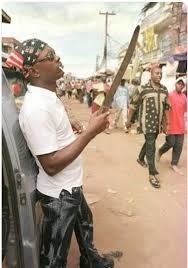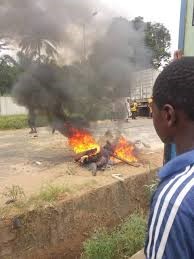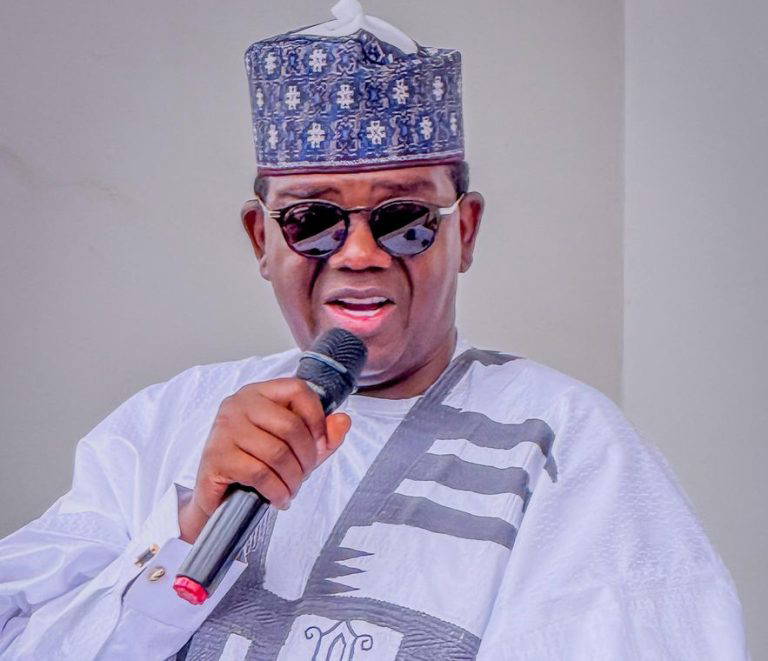Ndiwe, primarily known by his alias Derico Nwamama, was an infamous Nigerian serial killer and armed robber who terrorized Anambra State from 2000 until his capture by the Bakassi Boys in 2001. His reign of terror left an indelible mark on the region, making him one of the most feared criminals in the state’s history.
Nwamama’s criminal career began modestly as a pickpocket and street urchin. However, his activities escalated significantly when he transitioned into armed robbery at the young age of 22, during the tenure of Governor Chinwoke Mbadinuju. Initially, his targets were market women and banks, but his crimes quickly grew in both frequency and brutality.
Throughout his reign, Derico Nwamama was notorious for his ruthlessness and violence. It is reported that he was responsible for the deaths of 25 policemen and over 100 civilians. His actions were not just a series of criminal acts but a campaign of terror that paralyzed entire communities. From the bustling streets of Nnewi to the marketplaces of Nkpor, and from the quiet villages of Umuleri to the towns of Ihiala, the mere mention of Derico Nwamama’s name struck fear into the hearts of both young and old alike.
During his reign of terror, Derico Nwamama was said to be invisible and beyond arrest. His notoriety grew to mythical proportions, and he became a symbol of fear and invincibility. The dreaded Bakassi Boys, a vigilante group known for their relentless pursuit of criminals, embarked on a manhunt for this seemingly untouchable figure who killed without hesitation.
Nwamama led a formidable gang, and according to legend, he had killed over 100 people, including 25 police officers. His ruthless efficiency in countless bus robberies and his readiness to shoot victims without a second thought made him a feared and hated figure. After each successful raid, Nwamama would boast of his invincibility, placing great faith in the charms and protective amulets provided by traditional witch doctors, which he believed rendered him impervious to harm.

Derico Nwamama’s criminal operations were marked by a unique modus operandi. Despite terrorizing the entire southeastern region of Nigeria, he was not based there. His primary base of operations was Abuja, the Federal Capital Territory, from where he would occasionally travel to the southeast to carry out his acts of terror. This strategic location allowed him to evade capture and maintain a low profile between his brutal forays into the region.
Nwamama once made Umuleri, a town, his hiding place. He threatened the police from this location, vowing revenge for the deaths of his gang members. His network of hideouts included Agbor, Benin, and Asaba, among other locations, allowing him to strike quickly and seek cover. He gained tactical advantages from these hideouts, making it challenging for the authorities to anticipate his movements and capture him.
The illusion of invincibility that surrounded Derico Nwamama was a result of his clever use of various hideouts and his reliance on traditional charms. But when the Bakassi Boys caught him in 2001, his reign of terror finally came to an end, providing the people he had terrorized with a sense of relief and justice.
Even members of his gang and close friends who crossed him were ruthlessly eliminated by Derico Nwamama. One such victim was Chiejina, another notorious criminal from Aguleri, Anambra State. Before Derico rose to infamy, Chiejina was considered the deadliest armed robber in Anambra State, with Onitsha as the epicenter of his lethal operations.
Derico’s father also hailed from Aguleri, leading to an inevitable meeting between the two criminals. They quickly became friends and partners in crime, jointly orchestrating a series of armed robberies that struck fear into the hearts of many. However, their alliance was short-lived. Their strong personalities and differing views on how to conduct their criminal activities led to frequent and intense disputes.
At the height of their criminal prowess, both men were equally respected and feared throughout the area. Even though they were initially friendly, their relationship was unstable and soured due to a particularly intense disagreement about the direction and scale of their operations. Chiejina was unable to handle Derico’s deadly temperament as their confrontation turned violent. Derico immediately killed Chiejina by shooting him many times in a decisive and ruthless manner.
With Chiejina out of the way, Derico Nwamama emerged as the undisputed emperor of terror in Anambra State. His reputation for merciless violence and his willingness to kill even close associates solidified his status as the most feared criminal in the region. Chiejina’s death marked a turning point, as Derico’s dominance and ruthlessness became unparalleled, further entrenching his reign of terror until his eventual capture by the Bakassi Boys.
Governor Chinwoke Mbadinuju was not the only one deeply concerned about the reign of terror perpetrated by Derico Nwamama; even President Olusegun Obasanjo was enraged that such a criminal was allowed to unleash chaos in parts of Nigeria. The police were helpless, having lost many officers to the dreaded bandit, and seemed at their wits’ end on how to bring him and his gang to justice.
With the police and other security forces unable to end Derico Nwamama’s reign of terror, the responsibility fell to the Bakassi Boys, the militant wing of the Anambra Vigilante Services (AVS). This local vigilante group had been established to curb crime and criminality in the Southeast.
After numerous failed attempts by the Nigerian police force to capture Nwamama, Governor Mbadinuju called upon the Bakassi Boys to take over the mission. On July 3, 2001, the Bakassi Boys received intelligence that Nwamama was heading to Onitsha. They laid an ambush and intercepted him at Nkpor. Six days later, on July 9, 2001, the Bakassi Boys paraded Nwamama at the Ochanja market before executing him by beheading him with a machete.

Leading the hunt for and eventual capture of Derico Nwamama were the Bakassi Boys. Evidently, on one of his crime sprees, the hitherto elusive bandit was finally captured on Tuesday, July 3, 2001, while traveling from Agbor to Onitsha. The terrified villages of Anambra State experienced some respite after the Bakassi Boys’ determined action ended Nwamama’s cruel reign.
The news of Derico Nwamama’s capture and his dramatic entry into Onitsha spread like wildfire, igniting joyous celebrations throughout the town. The Bakassi Boys, true to their style, paraded through the streets in a motorcade, proudly displaying their captive. Armed with machetes, dane guns, and charms, they were met with admiration from the townspeople, who rejoiced that their days of living in fear had come to an end.
The Nigerian Police requested that Derico be handed over for investigation and prosecution, but the Bakassi Boys ignored the request.
On July 9, 2001, six days after capturing Derico at the Niger Bridge, the Bakassi Boys took him on a final ride through town. They chanted war songs as their convoy moved through Onitsha, ending at the Ochanja Market Junction on Upper Iweka Road. As their buses stopped, a wave of excitement and anticipation swept through the crowd, who knew what was coming.
Derico, gaunt and severely beaten, was dragged from the bus. His body was covered in cuts and gashes, evidence of the vigilante group’s brutal handling. He was clearly in pain, but the crowd was indifferent. The Bakassi Boys, still chanting war songs, were encouraged by the cheering crowd. Okpompi, one of their commanders, addressed the gathering, stating that their mission was to fight crime, not engage in politics.
Derico revealed that he was given sanctuary by an Abuja National Assembly member while he was evading capture. He further disclosed that the chairman of a local government council and a member of the Anambra State House of Assembly were two more strong protectors.
One of the most horrific public killings in Nigerian history transpired next. Derico was instantly beheaded by a Bakassi Boy’s blade, which struck his neck with the force of a guillotine. Blood spurted from his carotid arteries as his body crumbled, and his severed head rolled on the ground. It was a scenario out of a sacrificial ceremony.
Razor-sharp machetes then descended from various directions, chopping his remains into pieces. The mangled body parts were gathered, doused in fuel, and set ablaze, marking the gruesome end of Derico Nwamama’s reign of terror.
Sources




